The last two all-time great big men to play in the NBA, Shaq and Tim Duncan are often hotly debated about with respect to each other. Much of their respective physical primes overlapped, and they faced each other in a total of 4 playoff series, 3 of which were won by Shaq's Lakers.
While Tim Duncan was leading the Spurs to successive 50-win seasons alongside the likes of Greg Popovich, Manu and Tony Parker while winning MVP trophies on the way, the postseason was mostly Shaq's domain, as he won all 3 Finals MVP trophies during the Lakers' 3-peat to start this millennium.
What you'll read ahead is an attempt to compare and contrast their accolades, achievements and statistics and help basketball-crazy fans decide for themselves who the best big man of the league was in the 2000s:
#1 Biographical Details
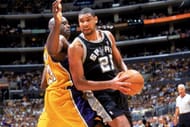
Explore the NBA Draft 2024 with our free NBA Mock Draft Simulator & be the GM of your favorite NBA team.
Both Shaq and Duncan played in the league for 19 seasons. Both of them were No.1 overall picks, and both have a legitimate case to be regarded as the greatest No.1 overall picks of all time.
While Shaq left LSU after three seasons of playing college ball at the age of 20, Duncan finished his program as he'd promised to his family before declaring for the 1997 NBA Draft, when three teams tanked in order to win the sweepstakes to draft him.
Both of them were able to virtually power their teams to the playoffs all by themselves, right off the bat.
Shaq and Penny made a Finals series after beating Michael Jordan's Bulls, and a move to the Western Conference with the Lakers saw them threepeat at the start of the 2000s.

#2 Longevity and Success
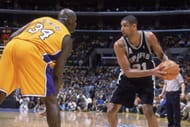
Both players, as explained before, played for 19 seasons, and were at least serviceable role players right up until the end.
While Shaq's threepeating peak with the Lakers is right up there among the best peak performances by a player in the playoffs, Duncan's peak of leading the Spurs to four titles in nine seasons is an achievement on pretty much the same level - every Finals series from 1999 to 2007 involved one of these two big men.
But Duncan aged significantly better, continued to be an All-NBA level player on both sides of the court, even making several All-Defensive teams on the wrong side of 30.
Shaq was never a fully engaged defender, particularly in the regular season, so he suffers in his All-Defensive Teams count. He did win three All-Star Game MVPs, though.

#3 Honours and Accolades
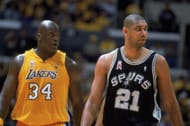
The coincidence of the two players' primes with that of Kobe meant that Shaq was not considered a serious MVP candidate after winning it once in the 1999-2000 NBA season.
The Lakers' regular season success split the votes between the two almost equally, resulting in Tim Duncan winning two successive MVP awards in the 2001-02 and the 2002-03 seasons.
Shaq played a stacked position at the start of his career, meaning that he lost a couple of All-NBA First Team selections to the likes of David Robinson and Hakeem Olajuwon.
With the context that we've provided, it's pretty hard to knock Shaq for coming out a bit lower than Duncan, though obviously, Duncan's superior longevity allowed him to accumulate more accolades.

#4 Per-game Averages
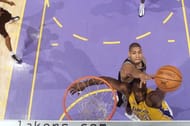
It is here that Shaq establishes his clear superiority over Duncan. For the first 14 seasons of his career, the lowest scoring average he tallied over an entire season was in 20 points per game in 2005-06.
His averages as a rookie are up there alongside Kareem, MJ, Wilt and Oscar as some of the most dominant numbers ever put up by a first-year player in the NBA.
He even averaged a double-double for his first 13 seasons, and fell short by an average of less than one rebound per game in 2005-06 - only Dwight Howard and Wilt Chamberlain have more consecutive seasons averaging a double-double.

#5 Career Totals
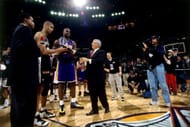
Shaq missed a lot more time due to injuries than Duncan did, altogether playing 185 fewer regular season games despite being available for the same number of seasons.
He caused a serious rift within the Lakers' locker room in the 2002-03, when he decided to 'heal on company time' and made a late comeback for the regular season campaign.
Duncan lost much of his explosiveness by the time he reached his late 20s and early 30s, the result of a meniscus tear that ruled him out of the 2000 playoffs.
But his totals bear out the notion that he aged more gracefully than Shaq.
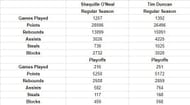
#6 Shooting splits
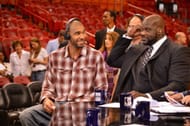
One of the criticisms of Shaq over the years is that his lack of a jump shot and his eventual, inevitable athletic decline forced him out of the league faster than other great big men like Kareem, David Robinson and Hakeem.
In his prime, however, he was unstoppable in transition, as a roll man as well as when he positioned himself in front of his defenders down in the low post, working his way to the bucket in a clunky, methodic manner that prompted the apt nickname of Diesel.
Duncan, by contrast, was a more skilled player, but this meant that he had to sacrifice his field goal percentages.
Often during his days with David Robinson, Duncan would take perimeter shots in order to leave room for his Twin Tower counterpart to operate inside the paint.
Both of them, however, managed to maintain themselves as above-average offensive players right up until the end of their careers.

Los Angeles Lakers Fan? Check out the latest Lakers depth chart, schedule, and roster updates all in one place.
